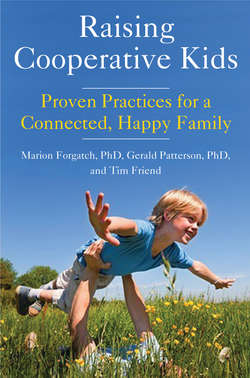Читать книгу Raising Cooperative Kids - Marion S. Forgatch - Страница 9
На сайте Литреса книга снята с продажи.
Shining the Light
ОглавлениеWe start in the first chapter by explaining why children say “no.” Then we help you define your goals as parents—think of it as your parenting wish list. Creating goals and making a plan to achieve them is a skill you will find useful time and time again as you raise your children. We show you how to determine the goals you set for your children and how to encourage progress toward those goals. As your children's best teachers, you set them up for success and then reward their many small achievements. We call this shining the light on the behavior you want to grow. Our strategies will help you balance positive reinforcement with negative sanctions in a way that leads to cooperation.
When teaching children how to thrive in today's society, you have to give them room to make mistakes. Your children will make mistakes. So will you. They don't have to be perfect, and neither do you. As a general rule, well-adjusted young children, whether they live in primitive rural villages or upscale suburban neighborhoods, comply with their parents' directives about 70 percent of the time. As children get older, their compliance rises to more than 80 percent. We use these figures as a benchmark for successful parenting. Knowing that children (and parents) don't have to be perfect allows you to concentrate on what they (and you) do right.
Changing unwanted behaviors that are already established is tougher than teaching new behaviors. That's normal. In fact, changing entrenched behavior is one of the most challenging things we do as human beings. How many times have you made New Years' resolutions only to find yourself slipping back into the habits you wanted to break? So, we ask you to remember that, sometimes, the positive steps you and your children take are so small that you can overlook them and allow mistakes to overshadow them. We will show you how to break goals into small steps and, as part of teaching through encouragement, how to “catch” your children being good.
As we all know, parenting involves a lot of trial and error. We have spent our careers studying the many challenges of raising children so that we can help you avoid common errors and adopt parenting techniques that have been proven to work. You can finally stop wasting time on hindsight and its latent 20/20 vision. We offer foresight that will allow you to create a vision for the family you want. You have the vision and we have strategies to encourage the positive behaviors that are shared by happy children and functional families throughout the world.
Our parenting approach prevents behavior problems from arising and improves stability in families, including those undergoing stressful changes like divorce, relocation, starting in a new school, or adjusting to a new step-family. Recently, we published a prevention study in which we followed the progress of single mothers for nine years after they participated in our parenting program. The results were exciting. After intervention, the lives of the mothers and their children continued to improve dramatically: mothers' parenting practices improved; their depression levels dropped; their children's cooperation improved and behavior problems often vanished; mothers obtained better jobs and achieved higher incomes; and most important, families were happier and more functional compared to those that did not receive the training. In another of our studies with step-families, we found that parents who used our techniques increased cooperation within the family, reduced children's aggressive behaviors, relieved problems at home and school, and built happier marriages.
